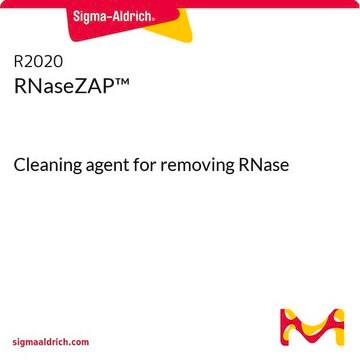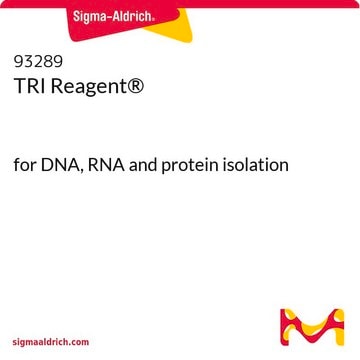R0901
RNAlater®
Stabilize and protect RNA with immediate RNase inactivation
Synonym(s):
RNA preservation solution, RNA protection solution, RNA protector, RNA stabilizer, RNA storage solution, RNA transportation solution
About This Item
Recommended Products
Quality Level
SMILES string
N([C@@H]([C@H](O)C)C(=O)N[C@@H](CCC(=O)O)C(=O)N[C@@H](CCCNC(=N)N)C(=O)O)C(=O)[C@@H](NC(=O)[C@@H](NC(=O)[C@@H](NC(=O)[C@@H](NC(=O)[C@@H](N)CCCNC(=N)N)CC(=O)N)C)CC(C)C)C
InChI
1S/C37H67N15O13/c1-16(2)14-23(50-28(57)17(3)46-33(62)24(15-25(39)54)51-30(59)20(38)8-6-12-44-36(40)41)32(61)47-18(4)29(58)52-27(19(5)53)34(63)48-21(10-11-26(55)56)31(60)49-22(35(64)65)9-7-13-45-37(42)43/h16-24,27,53H,6-15,38H2,1-5H3,(H2,39,54)(H,46,62)(H,
Related Categories
General description
RNAlater is an aqueous, non-toxic tissue storage reagent that rapidly permeates tissue to stabilize and protect cellular RNA in situ in unfrozen specimens. Tissue pieces are harvested and immediately submerged in RNAlater for storage without jeopardizing the quality or quantity of RNA. RNAlater eliminates the need to immediately process tissue specimens or to freeze samples in liquid nitrogen for later processing. RNAlater preserves RNA in tissues for up to 1 day at 37 °C, 1 week at 25 °C, and 1 month at 4 °C. Tissues can also be stored at -20 °C long-term.
RNAlater has been extensively tested on several tissues from vertebrate species, including brain, heart, kidney, spleen, liver, testis, skeletal muscle, fat, lung, and thymus. RNAlater is also effective for E. coli, Drosophila, tissue culture cells, white blood cells, and some plants.
Application
Features and Benefits
- No compromise in RNA quality following mRNA or total RNA isolation
- Rapidly permeates tissues to stabilize and protect cellular RNA
- Aqueous non-toxic solution allows downstream tissue processing
- Stabilizes samples at room temperature
Other Notes
Principle
Legal Information
also commonly purchased with this product
Storage Class Code
12 - Non Combustible Liquids
WGK
WGK 1
Flash Point(F)
Not applicable
Flash Point(C)
Not applicable
Choose from one of the most recent versions:
Already Own This Product?
Find documentation for the products that you have recently purchased in the Document Library.
Our team of scientists has experience in all areas of research including Life Science, Material Science, Chemical Synthesis, Chromatography, Analytical and many others.
Contact Technical Service








